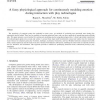Free Online Productivity Tools
i2Speak
i2Symbol
i2OCR
iTex2Img
iWeb2Print
iWeb2Shot
i2Type
iPdf2Split
iPdf2Merge
i2Bopomofo
i2Arabic
i2Style
i2Image
i2PDF
iLatex2Rtf
Sci2ools
112
click to vote
IJMMS
2007
2007
A fuzzy physiological approach for continuously modeling emotion during interaction with play technologies
The popularity of computer games has exploded in recent years, yet methods of evaluating user emotional state during play experiences lag far behind. There are few methods of assessing emotional state, and even fewer methods of quantifying emotion during play. This paper presents a novel method for continuously modeling emotion using physiological data. A fuzzy logic model transformed four physiological signals into arousal and valence. A second fuzzy logic model transformed arousal and valence into five emotional states relevant to computer game play: boredom, challenge, excitement, frustration, and fun. Modeled emotions compared favorably with a manual approach, and the means were also evaluated with subjective self-reports, exhibiting the same trends as reported emotions for fun, boredom, and excitement. This approach provides a method for quantifying emotional states continuously during a play experience. r 2006 Elsevier Ltd. All rights reserved.
| Added | 15 Dec 2010 |
| Updated | 15 Dec 2010 |
| Type | Journal |
| Year | 2007 |
| Where | IJMMS |
| Authors | Regan L. Mandryk, M. Stella Atkins |
Comments (0)

